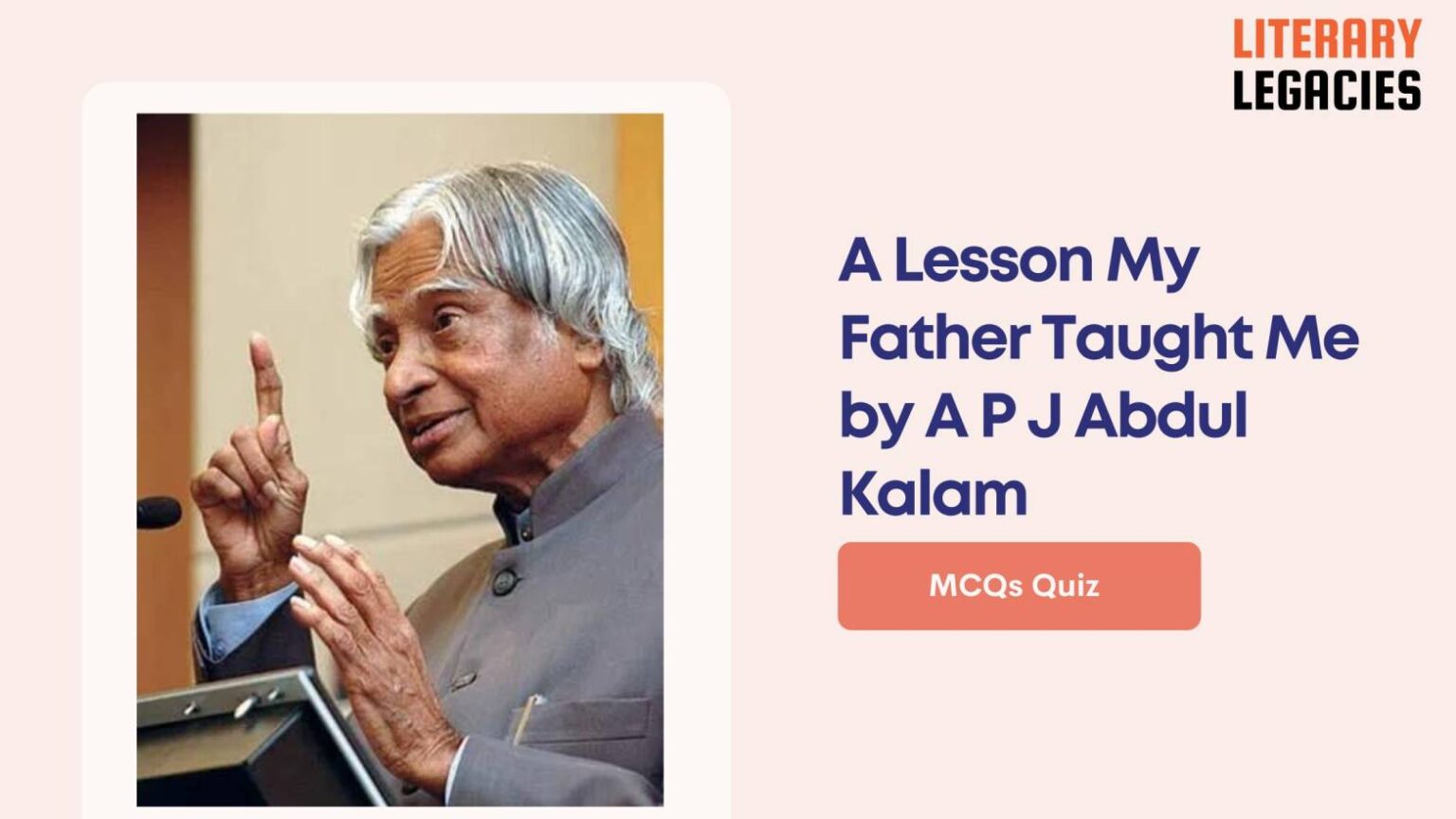1. What was the author’s father’s age when he passed away?
A. 100 years
B. 110 years
C. 93 years
D. 103 years
Answer: 103 years (D)
The author’s father lived a long and fulfilling life.
2. What was the occupation of the author’s father?
A. Government Officer
B. Teacher
C. Panchayat President
D. Businessman
Answer: Panchayat President (C)
The author’s father was a respected figure in the community.
3. What was the occasion when the author’s father was elected as the president of the panchayat board?
A. India’s Independence Day
B. Panchayat Elections
C. Local Festival
D. Republic Day
Answer: Panchayat Elections (B)
The author’s father was elected during a significant event in the community.
4. What was the population of Rameswaram at the time of the author’s father’s election?
A. 40,000 people
B. 10,000 people
C. 20,000 people
D. 30,000 people
Answer: 30,000 people (D)
Rameswaram was a small but beautiful town.
5. What was the quality that made the author’s father a good leader?
A. His community and language
B. His wealth and influence
C. His education and experience
D. His nobility of mind and good human nature
Answer: His nobility of mind and good human nature (D)
The author’s father was a respected leader in the community.
6. What was the author doing when he heard a knock at the door?
A. Helping with household chores
B. Reading a book
C. Playing with friends
D. Studying under a lamp
Answer: Studying under a lamp (D)
The author was a diligent student.
7. Why was the author’s father elected as the president of the panchayat board?
A. Because he spoke a particular language
B. Because he was from a particular community
C. Because he was wealthy and influential
D. Because he was a good human being
Answer: Because he was a good human being (D)
The author’s father was elected based on his character.
8. What was the author’s mother’s age when she passed away?
A. 85 years
B. 80 years
C. 93 years
D. 90 years
Answer: 93 years (C)
The author’s mother lived a long life.
9. What was the significance of the author’s father’s election?
A. It showed his father’s influence and power
B. It was a surprise to everyone in the community
C. It was a routine event in the community
D. It was a result of his nobility of mind and good human nature
Answer: It was a result of his nobility of mind and good human nature (D)
The author’s father’s election was a significant event in the community.
10. What did the author learn from his father?
A. To work hard and succeed
B. To be kind and compassionate
C. To live with integrity and succeed with integrity
D. To respect elders and traditions
Answer: To live with integrity and succeed with integrity (C)
The author learned valuable lessons from his father.
11. What was the author doing when someone came to the door?
A. He was reading silently from his study books.
B. He was praying with his mother.
C. He was sleeping on the cot.
D. He was reciting his study books aloud.
Answer: He was reciting his study books aloud. (D)
The author was fully concentrating on his studies.
12. What was the author’s father doing when the person came to the door?
A. He was at the market, buying gifts.
B. He was praying in the mosque.
C. He was out for evening namaz.
D. He was at home, sleeping.
Answer: He was out for evening namaz. (C)
The author told the person that his father had gone for evening namaz.
13. Why did the author’s father get upset when he saw the tambalum?
A. Because the fruits and sweets were spoiled.
B. Because the author had accepted a gift without permission.
C. Because the gift was not expensive enough.
D. Because the person did not leave a note.
Answer: Because the author had accepted a gift without permission. (B)
The author’s father quoted an Islamic Hadith about not taking gifts without permission.
14. What did the author’s father compare taking gifts to?
A. Eating a fruit and getting its nourishment.
B. Touching a snake and getting its poison.
C. Holding a mirror and seeing oneself.
D. Touching a rose and getting its beauty.
Answer: Touching a snake and getting its poison. (B)
The author’s father warned about the dangers of taking gifts.
15. What did the author’s father say happens when one takes a gift?
A. The person gets nothing in return.
B. The person gets blessings from the Almighty.
C. The person gets under an obligation to the giver.
D. The person gets a reward from the giver.
Answer: The person gets under an obligation to the giver. (C)
The author’s father quoted an Islamic Hadith about taking gifts.
16. What does Manu Smriti say about accepting gifts?
A. It extinguishes the divine light in the person.
B. It has no effect on the person.
C. It brings good fortune to the person.
D. It increases the divine light in the person.
Answer: It extinguishes the divine light in the person. (A)
Manu Smriti warns against accepting gifts for a specific reason.
17. Why does Manu Smriti warn against accepting gifts?
A. Because they are always accompanied by some purpose.
B. Because they are always expensive.
C. Because they are always given by friends.
D. Because they are always given by strangers.
Answer: Because they are always accompanied by some purpose. (A)
Manu Smriti warns against accepting gifts for a specific reason.
18. What happens to a person who accepts gifts, according to Manu Smriti?
A. They get punished by law.
B. They get more freedom to do as they please.
C. They get under an obligation to the giver.
D. They get stronger morally.
Answer: They get under an obligation to the giver. (C)
Manu Smriti warns against accepting gifts for a specific reason.
19. What is the significance of the lesson the author learned from his father?
A. It is a lesson that only applies to children.
B. It is a lesson that is not important at all.
C. It is a valuable lesson for the entire life.
D. It is a lesson that only applies to adults.
Answer: It is a valuable lesson for the entire life. (C)
The author says the lesson has a special significance in his life even now.
20. What is the author’s occupation?
A. He is a politician.
B. He is a businessman.
C. He is a teacher.
D. He is a former President of India.
Answer: He is a former President of India. (D)
The author is a former President of India.



